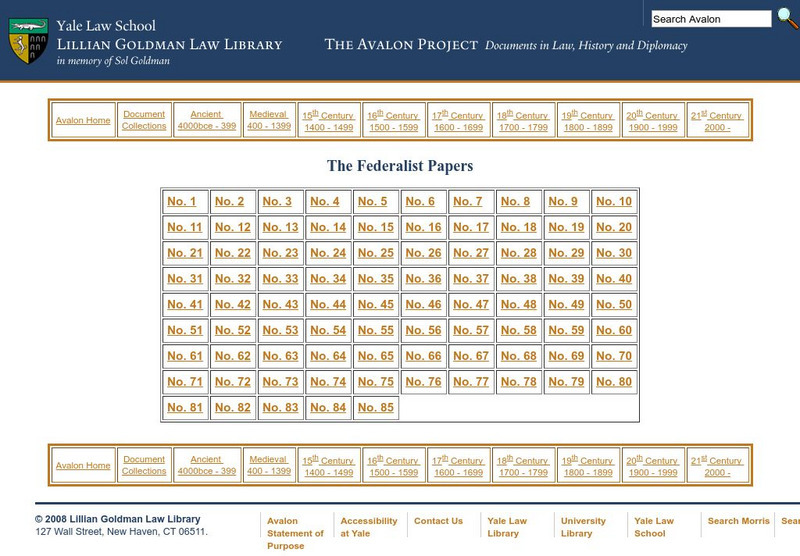Hi, what do you want to do?
Curated OER
Roles of Individuals and Groups in Politics
Students review the Federalist Paper by James Madison. They discuss the influence of interest groups in contemporary politics.
Curated OER
Federalist and Antifederalist Papers
Students debate the Federalist and Anti-federal Papers after using the Internet as a research tool.
Curated OER
Chapter 1 – The Constitution
In this colonial America worksheet, students read assigned textbook pages detailing the U.S. Constitution and respond to 46 short answer questions.
Curated OER
The Constitution
Eighth graders watch as their teacher presents information on the Constitution, government and laws through a PowerPoint presentation. In groups, they discuss the importance of government and laws and identify the main ideas in the...
Curated OER
Arguments Against Ratifying the Constitution
Students define federalism, Federalist, and Anti-Federalist, debate issue of ratification in classroom convention, and take vote on whether to add bill of rights. Three lessons on one page.
Curated OER
In His Own Words: James Madison On the Problem of Faction
Young scholars are introduced to the writings of James Madison and explain why he is often called "The Father of the Constitution". Using primary source documents, they examine his view of the Bill of Rights and what he meant by faction....
Curated OER
Washington and the Whiskey Rebellion
Students explore the Whiskey Rebellion of 1794 and its significance in the early history of the United States. They explore how George Washington made the choice to meet this challenge to federal authority with military force
Humanities Texas
Primary Source Worksheet: “Report on Manufacturers,” Annals of Congress
Invite your learners to take a look at life during the term of United States president George Washington through analysis of an interesting primary source. The document summarizes American manufacturing capacities, as detailed...
Music Publishers Association of the United States
I Made It. I Own It. Please Don't Steal It.
Explore the world of copyright law with a variety of activities to instill the importance of respecting creative property. Scholars watch an animated tale then take part in a grand conversation detailing the video's main idea, details,...
Curated OER
Boston Spies' Report on the Redcoats
Students collect information about British actions in Boston and send it by secret message to leaders in Philadelphia.
Curated OER
Graphic Organizing: Early American History
In collaborative groups, young US historians sort cards (each labeled with a single early American event or issue) according to which of the first four presidents was leading the country at the time. Learners copy the events onto a...
Curated OER
Introducing the Essay: Twain, Douglass, and American Non-Fiction
Students analyze American essayists Mark Twain and Frederick Douglass in an introduction to American literary non-fiction writing. In this essay history lesson, students identify methods for writing essays. Students read and analyze...
Curated OER
Constitutional Convention
Students engage in a role-playing situation to illustrate the kinds of compromised that were made a teh Constitutional Convention. They write three short 1-2 paragraph arguments and then present their arguments to the class at the...
Curated OER
Separation of Powers
Eighth graders research the three branches of government and examine the effect that the separation of powers has on the presidency. They explain the importance of the rule of law in establishing limits on both those who govern and the...
Curated OER
Our System of Checks and Balances
Students study the governmental system of checks and balances between the individual branches. The balances are reviewed and the goal of the lesson is to develop and answer the question, "What are some ways the three branches of our...
Curated OER
Alexander Hamilton
In this online interactive history worksheet, learners respond to 10 short answer questions about the accomplishments of Alexander Hamilton. Students may check some of their answers on the interactive worksheet.
Curated OER
Civic Virtue in Democracy
Learners identify and describe characteristics of civic virtue. Following a class discussion, they create their own definitions of civic virtue. They write essays based on their own definitions and formulate conclusions on the state of...
Curated OER
Federalism and the Prevention of Abuse of Power in the US Federal Government
Fourth graders stud Federalism and identify examples of abuse of power.
Curated OER
History of Supreme Court
Students study the role of the U.S. Supreme Court in U.S. history. They explore current events about the U.S. Constitution and discuss the Marbury v. Madison case from 1803. They identify the term "judicial review" and judicial...
Curated OER
Matching Events and People
In this social studies events worksheet, students match important events in history with people that were involved at the time. Students complete 13 matches.
Curated OER
It's Time to Put Our Money Where Our Mouths Are
Eighth graders choose a person who should be honored on our currency. They write a letter outlining the reasons for their choice.
Yale University
Avalon Project: The Federalist Papers
With this resource, you can search by keyword for particular subjects within the Federalist Papers, or you can access by number each of the Papers. Also available are links to four related documents: The Annapolis Convention, Articles of...
Khan Academy
Khan Academy: Us History: 1754 1800: The Federalist Papers
In the Federalist Papers, Alexander Hamilton, James Madison and John Jay made the case for ratifying the new US Constitution.
Yale University
Library of Congress: The Federalist Papers, No.41
This is a copy of Federalist Paper No. 41, authored by James Madison, in which he clearly defines the need to identify and restrain the power of the general government and then addresses the need to distribute that power among the branches.




























